英语八大时态讲解及练习
初中八种英语时态精讲精练(含答案)
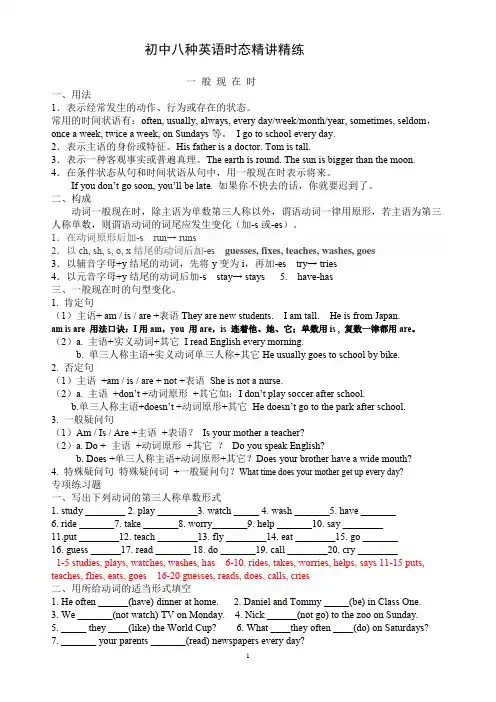
初中八种英语时态精讲精练一般现在时一、用法1.表示经常发生的动作、行为或存在的状态。
常用的时间状语有:often, usually, always, every day/week/month/year, sometimes, seldom,once a week, twice a week, on Sundays等。
I go to school every day.2.表示主语的身份或特征。
His father is a doctor. Tom is tall.3.表示一种客观事实或普遍真理。
The earth is round. The sun is bigger than the moon. 4.在条件状态从句和时间状语从句中,用一般现在时表示将来。
If you don’t go soon, you’ll be late. 如果你不快去的话,你就要迟到了。
二、构成动词一般现在时,除主语为单数第三人称以外,谓语动词一律用原形,若主语为第三人称单数,则谓语动词的词尾应发生变化(加-s或-es)。
1.在动词原形后加-s run→ runs2.以ch, sh, s, o, x结尾的动词后加-es guesses, fixes, teaches, washes, goes3.以辅音字母+y结尾的动词,先将y变为i,再加-es try→ tries4.以元音字母+y结尾的动词后加-s stay→ stays 5. have-has三、一般现在时的句型变化。
1. 肯定句(1)主语+ am / is / are +表语They are new students. I am tall. He is from Japan.am is are 用法口诀:I用am,you 用are,is 连着他、她、它;单数用is , 复数一律都用are。
(2)a. 主语+实义动词+其它I read English every morning.b. 单三人称主语+实义动词单三人称+其它He usually goes to school by bike.2. 否定句(1)主语+am / is / are + not +表语She is not a nurse.(2)a. 主语+don’t +动词原形+其它如:I don’t pla y soccer after school.b.单三人称主语+doesn’t +动词原形+其它He doesn’t go to the park after school.3. 一般疑问句(1)Am / Is / Are +主语+表语?Is your mother a teacher?(2)a. Do + 主语+动词原形+其它?Do you speak English?b. Does +单三人称主语+动词原形+其它?Does your brother have a wide mouth?4. 特殊疑问句特殊疑问词+一般疑问句?What time does your mother get up every day?专项练习题一、写出下列动词的第三人称单数形式1. study ________2. play ________3. watch _____4. wash _______5. have _______6. ride _______7. take _______8. worry_______9. help _______10. say ________11.put ________12. teach ________13. fly ________14. eat ________15. go _______16. guess ______17. read _______ 18. do _______19. call ________20. cry ________1-5 studies, plays, watches, washes, has 6-10. rides, takes, worries, helps, says 11-15 puts, teaches, flies, eats, goes 16-20 guesses, reads, does, calls, cries二、用所给动词的适当形式填空1. He often ______(have) dinner at home.2. Daniel and Tommy _____(be) in Class One.3. We _______(not watch) TV on Monday.4. Nick ______(not go) to the zoo on Sunday.5. _____ they ____(like) the World Cup?6. What ____they often ____(do) on Saturdays?7. _______ your parents _______(read) newspapers every day?8. The girl _______(teach) us English on Sundays.9. She and I ________(take) a walk together every evening.10. The moon ________ (travel) round the earth.11. It usually ________ (take) me more than two hours to finish my homework.12. I will tell him the good news as soon as he ________ (come) back.13. Miss Gao is very busy. She ________ (sleep) six hours a day.14. Look! Susan ________ (dance) in the garden. She often ________ (dance) there.15. The children will go to the Summer Palace if it ________ (not rain) tomorrow.16. I _________ any pears (not have). But Mary _________ some (have).17. What language ____ you _____? (speak) 18. My brother _____ to be a scientist. (not like) 19. We ______ Japanese at school. (not study) 20. He _____ playing football. (not like)1. has2. are3. don’t have4. doesn’t go5. Do like6. do, do7. Do, read8. teaches9. take 10. travels 11. takes 12. comes 13. sleeps 14. is dancing, dances 15. doesn’t rain 16. don’t have, has 17. do, speak 18. doesn’t like 19. don’t study 20. doesn’t like三、按照要求改写句子1. Daniel watches TV every evening.(改为否定句)_________________________2. I do my homework every day.(改为一般疑问句,并作肯、否定回答)________________________________________________________3. Amy likes playing computer games.(改为一般疑问句,并作肯、否定回答)___________________________________________________4. We go to school every morning.(改为否定句)____________________________5. Sun Yang usually washes some clothes on Saturday.否定句: _____________ 一般疑问句: ________________ 划线提问: ____________6. Tom does his homework at home.否定句: ______________ 一般疑问句: ____________ 划线提问_____________1. Daniel doesn’t watch TV every evening.2. Do you do your homework every day? Yes, I do. No, I don’t.3. Does Amy like playing computer games? Yes, she does. No, she doesn’t.4. We don’t go to school every morning.5. Sun Yang doesn’t usually wash any clothes on Saturday. Does Sun Yang usually wash any clothes on Saturday? What does Sun Yang usually do on Saturday?6. Tom doesn’t do his homework at home. Does Tom do his homework at home? Where does Tom do his homework?四、选用所给的词语适当形式填空give, rain, enjoy, sing, return, borrow, keep1. It often ______ in my hometown in summer.2. Sometimes the birds _______ in the tree.3. Joe usually ____ books from the school library, but she never _____ them on time.4. May I ________ the dictionary for a week?5. The little boy ________ himself in the garden on Saturdays.6. Mary is a good girl. She often ________ me a hand when I need some help.1. rains2. sing3. borrows, returns4. keep5. enjoys6. gives一般过去时的用法一、定义:表示过去某一时间所发生的动作或存在的状态;表示在过去一段时间内,经常性或习惯性的动作。
初中英语八种时态及被动语态的讲解与练习
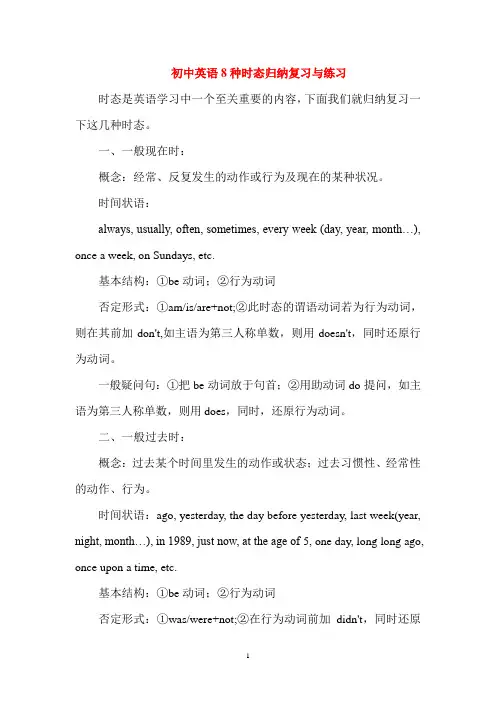
初中英语8种时态归纳复习与练习时态是英语学习中一个至关重要的内容,下面我们就归纳复习一下这几种时态。
一、一般现在时:概念:经常、反复发生的动作或行为及现在的某种状况。
时间状语:always, usually, often, sometimes, every week (day, year, month…), once a week, on Sundays, etc.基本结构:①be动词;②行为动词否定形式:①am/is/are+not;②此时态的谓语动词若为行为动词,则在其前加don't,如主语为第三人称单数,则用doesn't,同时还原行为动词。
一般疑问句:①把be动词放于句首;②用助动词do提问,如主语为第三人称单数,则用does,同时,还原行为动词。
二、一般过去时:概念:过去某个时间里发生的动作或状态;过去习惯性、经常性的动作、行为。
时间状语:ago, yesterday, the day before yesterday, last week(year, night, month…), in 1989, just now, at the age of 5, one day, long long ago, once upon a time, etc.基本结构:①be动词;②行为动词否定形式:①was/were+not;②在行为动词前加didn't,同时还原行为动词。
一般疑问句:①was或were放于句首;②用助动词do的过去式did 提问,同时还原行为动词。
三、现在进行时:概念:表示现阶段或说话时正在进行的动作及行为。
时间状语:now, at this time, these days, etc.基本结构:am/is/are+doing否定形式:am/is/are+not+doing.一般疑问句:把be动词放于句首。
四、过去进行时:概念:表示过去某段时间或某一时刻正在发生或进行的行为或动作。
初中英语8种时态复习及专题练习
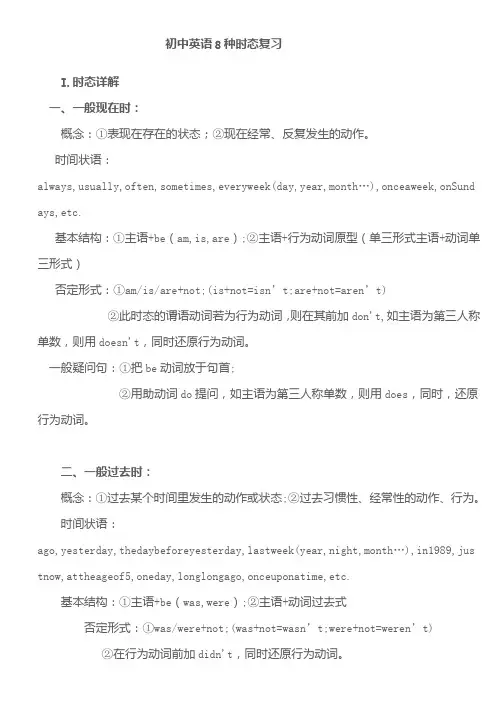
初中英语8种时态复习I.时态详解一、一般现在时:概念:①表现在存在的状态;②现在经常、反复发生的动作。
时间状语:always,usually,often,sometimes,everyweek(day,year,month…),onceaweek,onSund ays,etc.基本结构:①主语+be(am,is,are);②主语+行为动词原型(单三形式主语+动词单三形式)否定形式:①am/is/are+not;(is+not=isn’t;are+not=aren’t)②此时态的谓语动词若为行为动词,则在其前加don't,如主语为第三人称单数,则用doesn't,同时还原行为动词。
一般疑问句:①把be动词放于句首;②用助动词do提问,如主语为第三人称单数,则用does,同时,还原行为动词。
二、一般过去时:概念:①过去某个时间里发生的动作或状态;②过去习惯性、经常性的动作、行为。
时间状语:ago,yesterday,thedaybeforeyesterday,lastweek(year,night,month…),in1989,jus tnow,attheageof5,oneday,longlongago,onceuponatime,etc.基本结构:①主语+be(was,were);②主语+动词过去式否定形式:①was/were+not;(was+not=wasn’t;were+not=weren’t)②在行为动词前加didn't,同时还原行为动词。
一般疑问句:①was或were放于句首;②用助动词did提问,同时还原行为动词。
三、现在进行时:概念:表示现阶段或说话时正在进行的动作及行为。
时间状语:now,look,listen,atthistime,thesedays,etc.基本结构:be(am,is,are)+doing否定形式:be(am,is,are)+not+doing.一般疑问句:把be动词放于句首。
英语常用八种基础时态讲解和练习

英语常用八种基础时态讲解和练习LEKIBM standardization office【IBM5AB- LEKIBMK08- LEKIBM2C】英语时态一般现在时一般现在时通常用动词原形表示,但当主语是第三人称单数(he, she, it, Tom)时需要在在动词原形后面加-e或-es.如:一般现在时的基本用法1.表示主语现在的特征和状态,通常不用时间状语。
He is twelve, she is at home. She likes bread.2. 表示经常发生、反复发生的动作。
这种用法中与always, usually, often, sometimes, hardly ever, never, once a week等频度副词连用。
She often goes to the movies on weekends.--When is your birthday?--My birthday is January 15th.3.表示客观真理、科学事实、格言等。
The sun always rises in the east.太阳总是从东方升起。
The teacher said that the earth goes around the sun.4.一般现在表示将来时。
①. 表示按时间表拟定的或安排好,到时就发生的事情或动作。
The train arrives at 10:30. There is plenty of time.火车十点三十分到达,还有充足的时间。
She comes back next week.她下周会回来。
②在时间状语从句和条件状语从句中。
I will discuss this with you when we meet next time.下次见面时咱们再讨论。
If he arrives, please give me a phone call.现在进行时构成:be(am, is are)+现在分词。
初中英语八大时态详解及专项训练(附答案)(期末复习资料)!
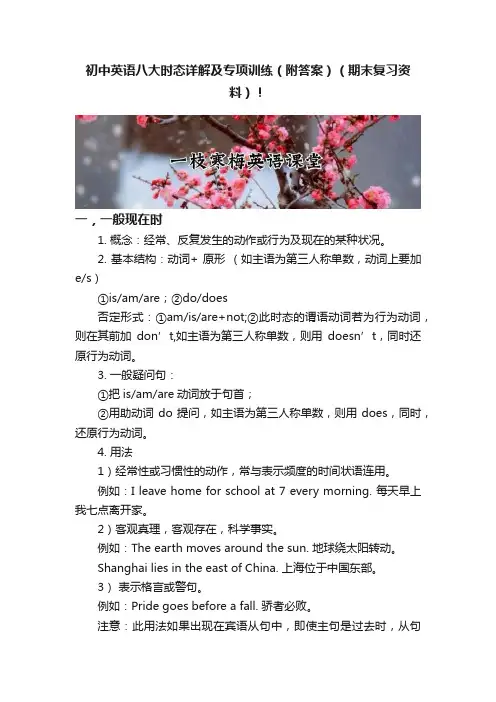
初中英语八大时态详解及专项训练(附答案)(期末复习资料)!一,一般现在时1. 概念:经常、反复发生的动作或行为及现在的某种状况。
2. 基本结构:动词+ 原形(如主语为第三人称单数,动词上要加e/s)①is/am/are;②do/does否定形式:①am/is/are+not;②此时态的谓语动词若为行为动词,则在其前加don’t,如主语为第三人称单数,则用doesn’t,同时还原行为动词。
3. 一般疑问句:①把is/am/are动词放于句首;②用助动词do提问,如主语为第三人称单数,则用does,同时,还原行为动词。
4. 用法1)经常性或习惯性的动作,常与表示频度的时间状语连用。
例如:I leave home for school at 7 every morning. 每天早上我七点离开家。
2)客观真理,客观存在,科学事实。
例如:The earth moves around the sun. 地球绕太阳转动。
Shanghai lies in the east of China. 上海位于中国东部。
3)表示格言或警句。
例如:Pride goes before a fall. 骄者必败。
注意:此用法如果出现在宾语从句中,即使主句是过去时,从句谓语也要用一般现在时。
例如:Columbus proved that the earth is round. 哥伦布证实了地球是圆的。
4)现在时刻的状态、能力、性格、个性。
例如:I don't want so much. 我不要那么多。
He writes good English but does not speak well.他英语写得不错,讲的可不行。
5)一般现在时表示将来含义。
a. 下列动词come, go, arrive, leave, start, begin, return的一般现在时可以表示将来,主要用来表示在时间上已确定或安排好的事情。
例如:The train leaves at six tomorrow morning. 火车明天上午六点开。
动词八大时态用法以及练习总结精华
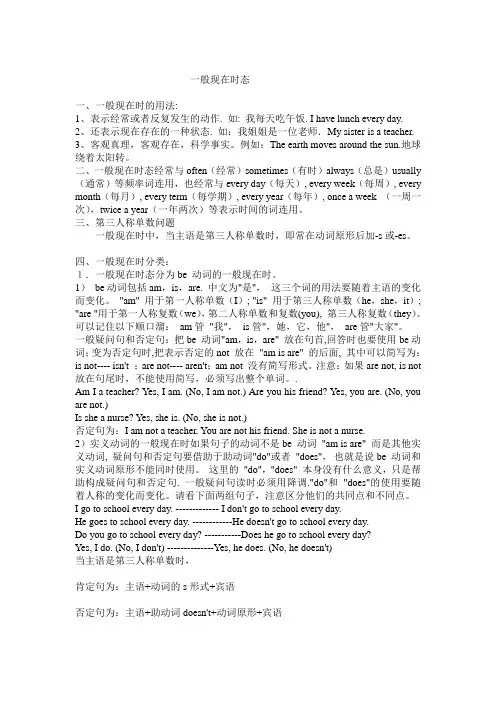
一般现在时态一、一般现在时的用法:1、表示经常或者反复发生的动作. 如: 我每天吃午饭. I have lunch every day.2、还表示现在存在的一种状态. 如:我姐姐是一位老师.My sister is a teacher.3、客观真理,客观存在,科学事实。
例如:The earth moves around the sun.地球绕着太阳转。
二、一般现在时态经常与often(经常)sometimes(有时)always(总是)usually (通常)等频率词连用,也经常与every day(每天), every week(每周), every month(每月), every term(每学期), every year(每年), once a week (一周一次),twice a year(一年两次)等表示时间的词连用。
三、第三人称单数问题一般现在时中,当主语是第三人称单数时,即常在动词原形后加-s或-es。
四、一般现在时分类:1.一般现在时态分为be 动词的一般现在时。
1)be动词包括am,is,are. 中文为"是",这三个词的用法要随着主语的变化而变化。
"am" 用于第一人称单数(I); "is" 用于第三人称单数(he,she,it); "are "用于第一人称复数(we),第二人称单数和复数(you), 第三人称复数(they)。
可以记住以下顺口溜:am管"我",is管",她,它,他",are管"大家"。
一般疑问句和否定句:把be 动词"am,is,are" 放在句首,回答时也要使用be动词;变为否定句时,把表示否定的not 放在"am is are" 的后面, 其中可以简写为:is not---- isn't ;are not---- aren't;am not 没有简写形式。
初中英语语法-八种时态详解与练习
初中英语语法:八种时态详解与练习一.概念:英语中表示不同时间发生的动作或存在的状态,需用不同的动词形式表示,这种不同的动词形式称为时态。
二.种类:(基本时态)一般现在时一般过去时现在进行时过去进行时一般将来时过去将来时现在完成时过去完成时一般现在时一、概念:经常、反复发生的动作或行为及现在的某种状况。
二、常搭配的时间状语:always, usually, often, sometimes, every week (day, year, month…), once a week,on Sundays, etc.三、基本结构①be动词(is,am,are);②行为动词(主语是第三人称单数时谓语动词要加s或es外) 否定形式:①am/is/are+not;②此时态的谓语动词若为行为动词,则在其前加don't,如主语为第三人称单数,则用doesn't,同时还原行为动词。
一般疑问句:①把be动词放于句首;②用助动词do提问,如主语为第三人称单数,则用does,同时,还原行为动词。
例句:I go to school at 6 every morning. 每天早上我七点去上学。
Summer follows spring. 春天之后是夏天。
I learned that the earth goes around the sun when I was in primary school. 我在小学就学过地球是围绕太阳转的。
Pride goes before a fall. 骄者必败。
四、基本用法:1) 描述当前时间内经常出现、反复发生的动作或存在的状态。
在这种情景中,句子常带有表示频率的时间状语:always , everyday , often , once a week (month , year , etc.) , sometimes , seldom , usually等等,以表示句中的动作或状态是习惯性的、经常性的。
英语八种时态讲解及练习
现在进行时
作谓语的动词用来表示动作(情况) 发生时间的各种形式称为时态。
1.概念:表示现阶段或说话时正在 进行的动作及行为。 2.时间状语:Now, at this time, days, look. listen等时间状语做标志。 3.基本结构:主语+be +doing +其 他 4.否定形式:主语+be +not +doing+ 其他 5.一般疑问句:把be动词放于句首。
现在分词的变法有
1)、一般在动词词尾加上-ing ,E.g. jump 2)、以不发音字母e结尾的动词,先 去e,再加-ing. E.g have write 3)、.以重读闭音节末尾只有一个辅 音字母结尾的词,它前面是单个元 音字母时要先将词尾的辅音字母双 写,再加上-ing. E.g. sit put 其句式 变换都在be上做文章。
10. I will go there when I _____(have, will have, has) time tomorrow. 11. He won’t come to the party unless he _____(be, will be, am, is, are) invited. 12. I’ll wait here until my mother ____(come, comes, will come) back. 13. Please return the book to the library as soon as you ______(finish, finishes, will finish) reading it. 14. Once you _____(see, sees, will see) him, you will never forget him.
最新英语8种时态讲解及练习
英语时态八种基本时态讲解及练习一.概念:英语中表示不同时间发生的动作或存在的状态,需用不同的动词形式表示,这种不同的动词形式称为时态。
二.种类:(基本时态)一般现在时一般过去时现在进行时过去进行时一般将来时过去将来时现在完成时过去完成时三.用法:1)一般现在时表示经常发生或习惯性的动作或状态及客观现实和普遍真理。
一般现在时常以动词原形表示,但当主语是第三人称单数时,动词词尾加-s或-es。
2)句型结构:主语+V.(包括be动词)+宾语+…She is an engineer.He has breakfast at 6:00every day.3)注意:a)一般现在时通常与always , often , usually , every day , sometimes , once a week等时间状语连用。
I always watch TV at 8: 00 in the evening .They go home once a week .We usually do our homework at home .b)表客观现实或普遍真理。
The sun always rises in the east .The light travels faster than the sound .c)表永远性的动作或状态。
He lives in the country .4)第三人称单数变化形式。
a)一般情况动词在词尾加-s .come---comes speak---speaks work---works live---lives b)以o, s, x, ch, sh结尾的单词在词后加-es.do---does go---goes finish---finishes brush---brushes fix---fixes pass---passes watch---watchesc)以“辅音字母+y”结尾的单词变y为i加-es.Study---studies carry-carries cry---criesd)以“元音字母+y”结尾的单词直接加-s.play---plays stay---stays例句:我们每天晚上九点做作业。
初中英语语法八大时态总结及练习题
英语语法八大时态一.一般现在时结构肯定句式: 主语+动词原形/动词的第三人称单数+其他否定句式: 主语+(助动词)don't/doesn't +动词原形+其他一般疑问句式: Do/Does+主语+动词原形+其他简略回答: (肯)Yes,主语+do/does (否)No,主语+do/does not缩写形式: don't = do not doesn't = does not例句:He often goes swimming in summer.I usually leave home for school at 7 every morning.二.一般过去时态结构肯定句式: 主语+动词过去式+其他否定句式: 主语+(助动词)didn’t +动词原形+其他一般疑问句式: Did+主语+动词原形+其他基本结构否定句一般疑问句Be动词was/were+not was/were提前,放于句首行为动词didn’t+do(动词原形)Did+主语+do(动词原形)三.一般将来时结构结构1:肯定句式:主语+助动词will+动词原形+其他否定句式:主语+助动词will+动词原形+not+其他一般疑问句式:助动词Will+主语+动词原形+其他简单回答:在口语中,will在名词或代词后常缩为’ll,wii not常简缩为won’t。
在疑问句中,主语为第一人称时(I和we)时,常用助动词shall。
例如:She’ll go to play basketball.Shall we go to the zoo?结构2:肯定句式:主语+be going to +动词原形+其他否定句式:主语+be not going to +动词原形+其他一般疑问句式:Be+主语+going to+动词原形+其他简略回答:(肯)Yes,主语+be (否)No,主语+be not将来时其他表示法1)be going to表示将来表示说话人的打算、计划、安排或根据迹象判断必然或很可能发生的事情。
- 1、下载文档前请自行甄别文档内容的完整性,平台不提供额外的编辑、内容补充、找答案等附加服务。
- 2、"仅部分预览"的文档,不可在线预览部分如存在完整性等问题,可反馈申请退款(可完整预览的文档不适用该条件!)。
- 3、如文档侵犯您的权益,请联系客服反馈,我们会尽快为您处理(人工客服工作时间:9:00-18:30)。
英语八大时态讲解及练习英语八大时态讲解及练习文章类型:资料文章阅读次数: 28362日期:12/28/2008英语的时态(tense)是一种动词形式,不同的时态用以表示不同的时间与方式,下面就英语中常见的八种基本时态进行阐述,其它的时态都是在这八种时态的基础上结合而成的。
一、一般现在时:1.概念:经常、反复发生的动作或行为及现在的某种状况。
2.时间状语: always, usually, often, sometimes, every week (day, year, month…), once a week, on Sundays,3.基本结构:动词原形(如主语为第三人称单数,动词上要加(e)S)4.否定形式:am/is/are+not;此时态的谓语动词若为行为动词,则在其前加don't,如主语为第三人称单数,则用doesn't,同时还原行为动词。
5.一般疑问句:把be动词放于句首;用助动词do提问,如主语为第三人称单数,则用does,同时,还原行为动词。
6.例句:. It seldom(很少) snows here.He is always ready to help others.Action speaks louder than words.二、一般过去时:1.概念:过去某个时间里发生的动作或状态;过去习惯性、经常性的动作、行为。
2.时间状语:ago, yesterday, the day before yesterday, last week(year, night, month…), in 1989, just now, at the age of 5, one day, long long ago, once upon a time, etc.3.基本结构:be动词;行为动词4.否定形式:was/were+not;在行为动词前加didn't,同时还原行为动词。
5.一般疑问句:was或were放于句首;用助动词do的过去式did 提问,同时还原行为动词。
6.例句:She often came to help us in those days.I didn't know you were so busy.三、现在进行时:1.概念:表示现阶段或说话时正在进行的动作及行为。
2.时间状语:now, at this time, these days, etc.3.基本结构:am/is/are+doing4.否定形式:am/is/are+not+doing.5.一般疑问句:把be动词放于句首。
6.例句: How are you feeling today?He is doing well in his lessons.四、过去进行时:1.概念:表示过去某段时间或某一时刻正在发生或进行的行为或动作。
2.时间状语:at this time yesterday, at that time或以when引导的谓语动词是一般过去时的时间状语等。
3.基本结构:was/were+doing4.否定形式:was/were + not + doing.5.一般疑问句:把was或were放于句首。
6.例句:At that time she was working in a PLA unit.When he came in, I was reading a newspaper.五、现在完成时:1.概念:过去发生或已经完成的动作对现在造成的影响或结果,或从过去已经开始,持续到现在的动作或状态。
2.时间状语:recently, lately, since…for…,in the past few years, etc.3.基本结构:have/has + done4.否定形式:have/has + not +d one.5.一般疑问句:have或has。
6.例句:I've written an article.It has been raining these days.六、过去完成时:1.概念:以过去某个时间为标准,在此以前发生的动作或行为,或在过去某动作之前完成的行为,即“过去的过去”。
2.时间状语:before, by the end of last year(term, month…),etc.3.基本结构:had + done.4.否定形式:had + not + done.5.一般疑问句:had放于句首。
6.例句:As soon as we got to the station, the train had left.By the end of last month. We had reviewed four books七、一般将来时:1.概念:表示将要发生的动作或存在的状态及打算、计划或准备做某事。
2.时间状语:tomorrow, next day(week, month, year…),soon, in a few minutes, by…,the day after tomorrow, etc.3.基本结构:am/is/are/going to + do;will/shall + do.4.否定形式:was/were + not; 在行为动词前加didn't,同时还原行为动词。
5.一般疑问句:be放于句首;will/shall提到句首。
6.例句:They are going to have a competition with us in studies.It is going to rain.八、过去将来时:1.概念:立足于过去某一时刻,从过去看将来,常用于宾语从句中。
2.时间状语:the next day(morning, year…),the followingmonth(week…),etc.3.基本结构:was/were/going to + do;would/should + do.4.否定形式:was/were/not + going to + do;would/should + not + do.5.一般疑问句:was或were放于句首;would/should 提到句首。
6.例句:He said he would go to Beijing the next day.I asked who was going there练习题1. He __________ back a month ago. (come)2. My mother often tells me __________ in bed. (not read)3. I must take it back the day after tomorrow. You can only __________ it for 24 hours. (保存)4. Why have you kept me __________ here for so long a time? (wait)5. Please come to our meeting if you __________ free tomorrow. (be)6. She __________ to the Great Wall several times. (goes)7. In his letter, he said that he __________ us very much. (miss)8. The film __________ for nearly fifteen minutes when I got to the cinema. (be)9. He said he became __________ in physics. (interest)10. This film is worth __________. (see)11. He went to school instead of __________ home. (go)12. In the old days it was difficult for the poor to __________ a job. (找)13. It's cold outside, so you'd better __________ your coat. (穿上)14. He is hungry. Please give him something __________. (eat)15. Please don't waste time __________ TV every evening. You should word hard at English. (watch)16. We found the window __________. (break)17. You have dropped your pencil. __________. (拾起来)18. Mother often tells me __________ too late. (not come home)19. You had better __________ by bus, or you will be late. (go)20. I will __________ Li Ming the good news as soon as I see him. (告诉)21. Great changes __________ in our country since 1978. (take place)22. I __________ my daughter since last month. (hear from)23. It __________ me two days to write the article. (花费)24. Don't touch that __________ child. (sleep)25. Every time he tried to start the car, the wheels ________deep into the mud. (sink)26. When I got home, I found that my room __________ breaks into sanda lot of things __________. (steal)27. If I had arrived there earlier, I __________ him. (meet)28. I didn't remember __________ her the book before. (give)29. He called at every door, __________ people the exciting news. (tell)30. Yesterday Mary couldn't finish her homework, so she has to go on __________ itthis afternoon. (do)31. We __________football when it began to rain. We had to stop and go home. (play)32. Xiao Lin __________ from here for about two hours. (be away)33.swheres__________? Can you find your birth place on the map? Sorry, I can't. (be born)34. Last night we __________ back home until the teacher left school. (not go)35. Comrade Li Dazhao __________ in prison in 1927. (put)36.swheresis professor Lee?He __________ to the library. He'll come back soon. (go)37. We could not help __________ after we heard the story. (laugh)38. Would you please __________ me an English-Chinese dictionary when you come? (bring)39. He told me that he __________ the Great Wall the year before. (visit)40. I'll tell him the news as soon as he __________ back. (come)41. The boy __________ by the door is my brother. (stand)42. Do you remember __________ the film last year? (see)43. There __________ a physics test next Monday. (be)44. __________ I finish my homework in class? (必须)No, you needn't.45. I'm sorry you've missed the last bus. It __________ ten minutes ago. (leave)46. Wei Fang is heard __________ English every morning. (read)47. John stopped __________a rest (have) because he __________for three hours. (work)48. I'm sorry to have kept you __________. (wait)49. A new theatre __________ now. (build)50. The boys __________ basketball on the playground are my classmates. (play)51. I regretted answering like that, I was sorry __________ so. (do)52. Can't you see I'm busy __________? (cook)53. He __________ worried when coming into the teacher's office. (look)54. __________ come beef! (随便吃点)55. It's a great shame for me __________ in front of so many people. (laugh at)答案1. came2. not to read3. keep4. waiting5. are6. has been7. missed8. had been on9. interested 10. seeing11. going 12. find 13. put on 14. to eat 15. watching16. broken 17. Pick it up 18. not to come home 19. go 20. tell21. have taken place 22. have heard from 23. took 24. sleeping 25. sank 26. had been broken into / stolen 27. would have met28. giving 29. telling 30. doing 31. were playing32. has been away 33. were you born 34. didn't go 35. was put36. has gone 37. laughing 38. bring 39. had visited 40. comes41. standing 42. seeing 43. is going to be 44. Must 45. left46. to read 47. to have…had worked 48. waiting 49. is being built 50. playing51. to do / to have done 52. cooking 53. looked 54. Help yourself to 55. to be laughed at【打印文章】【关闭窗口】。
